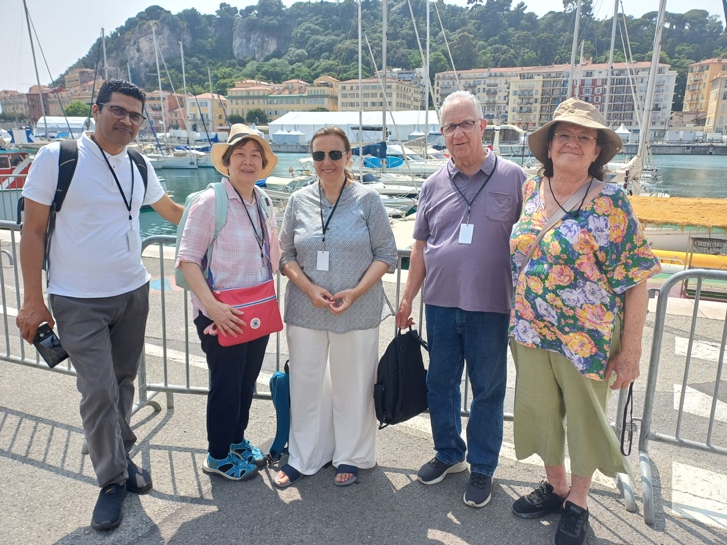Photo of Maryknoll Sister Lacson and Maryknoll Father John Sivalon at the UN Oceans Conference in Nice, France in June 2025 courtesy of Sr. Margaret Lacson, MM.
UN: Third Oceans Conference Convenes
World leaders met in Nice, France, from June 9-13, to discuss sustainability of the world’s oceans. Maryknoll Sister Margaret Lacson and Maryknoll Father John Sivalon report back.
Five years remain until the deadline to the 15-year timeframe the UN set to implement its Sustainable Development Goals (SDG). For the furtherance of goal number 14, “Conserve and sustainably use the oceans, seas and marine resources,” the third UN Oceans Conference (UNOC3) met in Nice, France early in June to discuss the issues affecting the biome that makes up 80 percent of Earth’s surface.
There are four major interrelated oceans stressors: global warming, fossil fuel emissions, waste nutrients, and plastics.
In the last 40 years, half of all coral reefs have fallen victim to coral bleaching and infectious diseases associated with climate change. It is estimated that with an average global temperature increase of 1.5 degrees centigrade, the loss could reach between 70 to 90 percent. As the ocean absorbs about 30 percent of the carbon dioxide produced by burning fossil fuels, the water becomes acidic, further contributing to coral reef loss and negatively impacting marine life.
The loss of ocean oxygen levels along coastal areas creates “dead zones” where species cannot survive. There are more than four hundred of these dead zones throughout the oceans at various depths, forming an area roughly the size of the United Kingdom. The main cause of these dead zones, especially along the coasts, is the runoff of nutrients from fertilizers and wastewater contamination, either directly into the ocean or in rivers and streams that run into it.
As another stressor, humanity produces 430 million tons of plastic waste each year, of which only 9 percent is recycled. The rest ends up in landfills, incinerated or leaked. About eight million tons are transported directly to the ocean. Most of this comes from single-use plastics and lost or discarded fishing gear.
At issue is not just the plastic we can see. Micro-plastics, nanoscopic particles of plastic, and plastics’ chemical additives, affect marine life at all depths and in all areas of the ocean including Antarctica.
Now, a new artificial threat to the oceans has emerged: deep seabed mining.
Maryknoll co-sponsored a side event on this topic, titled “Disturbance in the Deep: A Rights-Based and Values-Based Approach to Deep Sea Conservation.” Most speakers called for at least a moratorium on seabed exploitation until more research could be done. The president of the EU Council said that “it is a risk the world cannot afford and does not need to take.” Among civil society organizations, the demand was overwhelmingly for an outright ban. So far, thirty-seven member states have declared their support for a moratorium or ban. Even the new secretary general of the International Seabed Authority has sounded a call for caution and voiced her dismay with the United States for its unilateral decision to consider authorizing contracts to begin exploitation in international waters.
During the conference, major negotiations were proceeding among member states on oceans treaties. The most often mentioned was Biodiversity Beyond National Jurisdiction (BBNJ), which covers the conservation and sustainable use of marine biological diversity in international waters. This agreement requires sixty states to ratify it to become binding. At the beginning of the conference, around thirty countries had ratified it. By the end of the conference, fifty countries had.
The other contested treaty dealt with plastics. The discussions around this treaty were more contentious, but the executive director of the UN Environmental Programme was optimistic that the negotiations would lead to an agreement. Even without a treaty, though, individuals and institutions can consciously reduce consumption of single use plastics.
As the conference emphasized, the ocean is a single global biome. It has no sections that can be dealt with in isolation. It demands that the UN take a holistic approach, instead of the present patchwork of disconnected treaties, conventions, and conferences. It was this level of oneness in mind that led Maryknoll Fathers and Brothers and Maryknoll Sisters to join other faith leaders in developing “The Faith in the Ocean Declaration,” launched at UNOC3 in Holy Trinity Anglican Church in Nice. The declaration has well over 550 signatories calling for a radical new consciousness of our relationship to the ocean, and through it our relationship to climate change and biodiversity loss.
Faith in action: Read and sign the Faith in the Ocean Declaration https://mogc.me/fio
See the full recording of the webinar co-sponsored by Maryknoll Fathers and Brothers and Maryknoll Sisters https://mogc.me/dsm-sideevent

